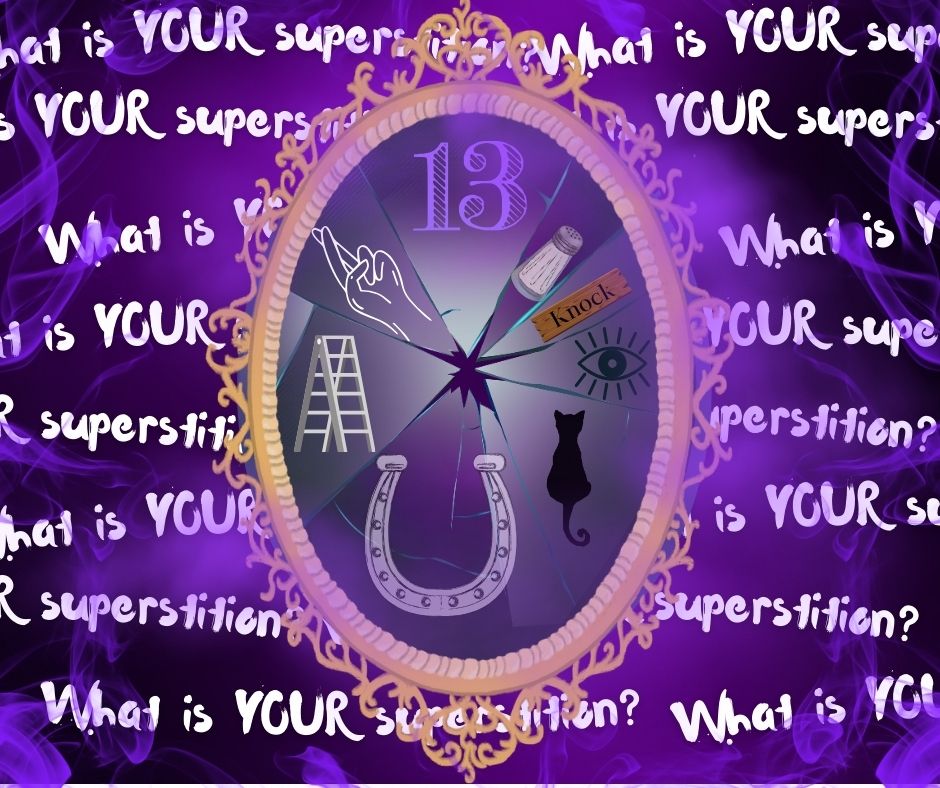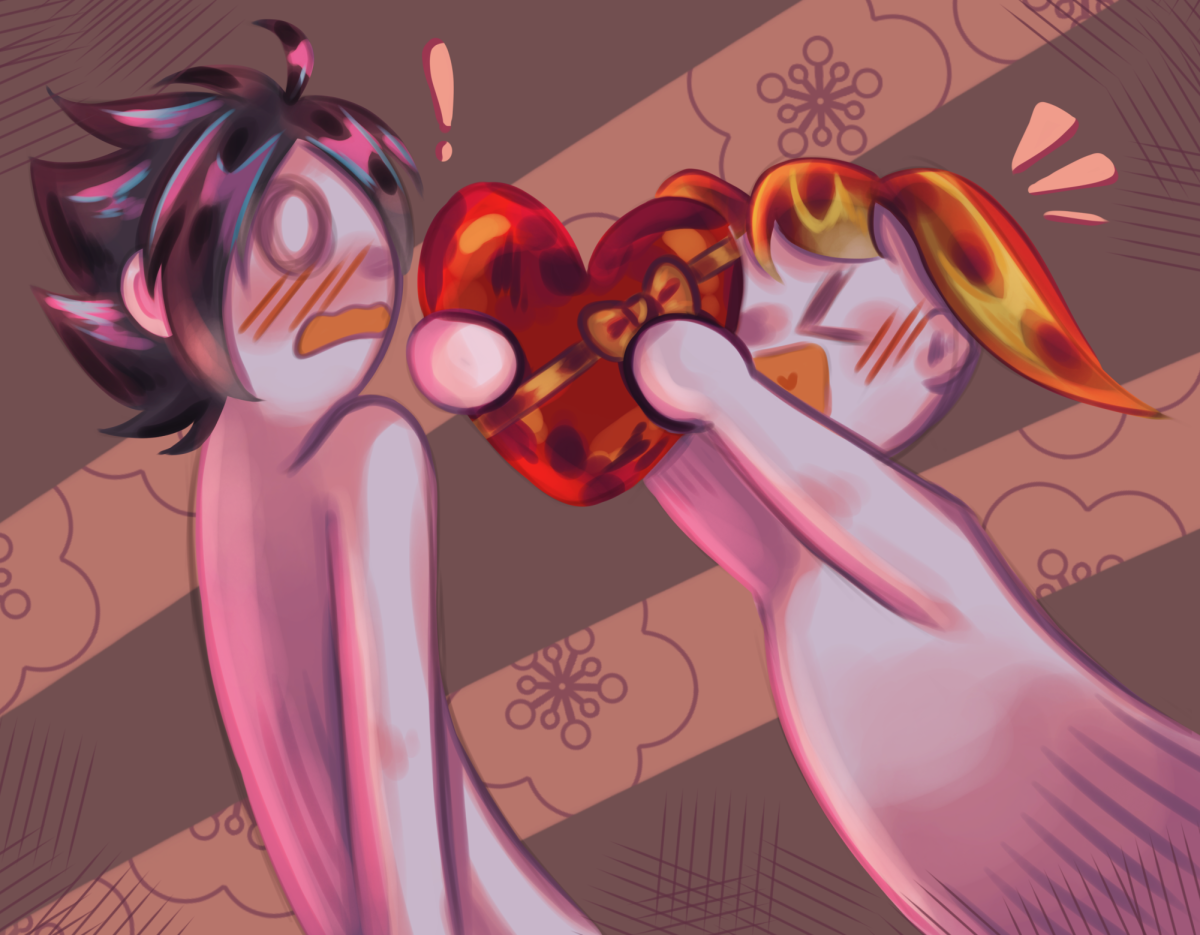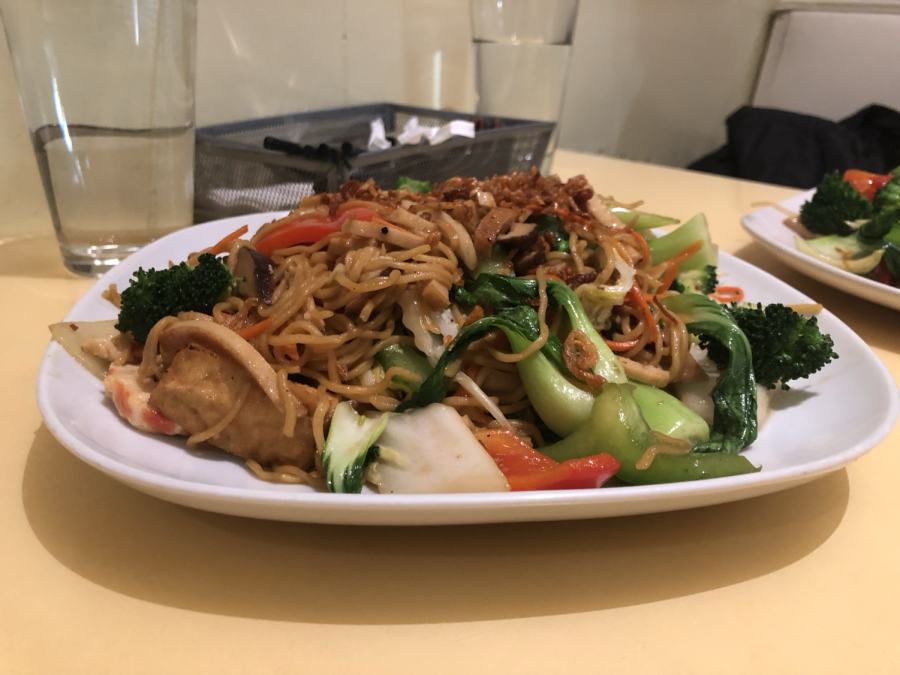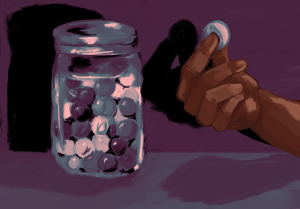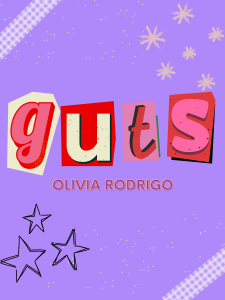Loving Hut: the Vegan, Vietnamese Restaurant with an Elusive Past
With over 200 locations worldwide, Loving Hut is the fastest-growing vegan restaurant in the world. However, its founder, Supreme Master Ching Hai, has faced criticism for being a “cult leader.”
Loving Hut’s vegan stir-fried noodles feature broccoli, bok choy, and other assorted vegetables, as well as tofu and imitation shrimp as meat substitutes.
January 26, 2023
There are an estimated 79 million vegans worldwide. About 2 million of them belong to a group led by a 73-year-old woman referred to as Supreme Master Ching Hai. Over 200 of those people have the fortune of spreading their vegan-centered message via unlikely means, a chain restaurant called Loving Hut. One of them is right here in Virginia, nestled in Falls Church a mere 35 minutes away, attached to the back of a 7-Eleven.
Vincent Hải Nguyễn and his wife are the owners of the Loving Hut at 2842 Rogers Dr., Falls Church, VA, 22042. Monday through Sunday, 11 a.m. to 9 p.m., customers of all kinds come in to enjoy all-vegan food. The menu mainly features Vietnamese and Chinese food with items like phở, bánh mì, and dumplings, but also expands to include items from other cultures like samosas and burgers. Along with his own Vietnamese influences and his wife’s Chinese-Vietnamese influences, Nguyễn put together his menu by traveling to other Loving Huts and picking the best from each of their menus. Prices range anywhere from $2.00 for flan to $14.95 for stir-fried noodles with mixed vegetables (mì xào mềm).
The Loving Hut company was founded by Supreme Master Ching Hai in 2008. Nguyễn himself has been a student of hers for 33 years and opened his own franchise location in 2011. “The Master,” as she is referred to on her website, has commonly been viewed as a cult leader, although Nguyễn believes that the movement is a cult just as much as Jesus Christ and Buddha were cults when they were new. “When you start something new, people don’t appreciate it because they don’t understand it,” Nguyễn said. Born Huệ Đăng Trịnh to Catholic parents in 1950, Hai has now amassed roughly 600,000 followers, with some estimates as high as 2 million people.
According to the biography on her website, she grew up enjoying “philosophical literature when the other children were doing homework and playing,” much to the concern of her “highly-reputed naturopath” father. Later on, she became a Buddhist nun (as her grandmother was Buddhist and her parents were open to Buddhism) and a Red Cross translator in Germany, during which she witnessed the hardship of many refugees. This ultimately led her to pursue her spiritual goals and mutually separate from her German scientist husband. In general, the details of her early life are foggy and/or unknown, but she claims that she eventually discovered a “Himalayan Master who initiated her into the Quan Yin Method.”
The Quan Yin Method, also called “the meditation on Inner Light and Inner Sound,” is now one of the core practices of Ching Hai’s followers. In order to become an official follower, one must undergo an initiation during which specific instructions on this method are given and the “Spiritual Transmission” is provided. “Initiation means she would open your third eye,” Nguyễn said. “[In a Buddhist temple], the Buddha statue has a mark on his forehead. That’s the wisdom eye. So basically, the Master Ching Hai will open your wisdom eye, and that’s called initiation; that’s it. And after that, you meditate from your wisdom eye.”
After initiation, the only requirements are that you must meditate using the Quan Yin method daily and keep the Five Precepts:
- Refrain from taking the life of sentient beings. This precept requires strict adherence to a vegan diet. No meat, fish, poultry, or eggs (fertilized or non-fertilized).
- Refrain from speaking what is not true.
- Refrain from taking what is not yours.
- Refrain from sexual misconduct.
- Refrain from using intoxicants. This includes avoiding all poisons of any kind, such as alcohol, drugs, tobacco, gambling, pornography, and excessively violent films or literature.
“First, you have to be a vegan, and then, you are supposed to meditate two [to] two-and-a-half hours a day: that’s it!” Nguyễn said. “That’s the only requirement.”
Nguyễn grew up helping his mother’s family business in Việt Nam. “It was a lot of hard work,” Nguyễn said. “I had to wash dishes and run around bringing food to people.” He originally discovered Supreme Master Ching Hai after “searching for a spiritual path.” After this, he became a vegan, viewing it as a necessity for practicing spiritually. He went on to learn about the killing of animals and the impacts of animal farming on climate change.
This drove Nguyễn to, first, become a vegan, and second, open his own franchise to promote veganism. “As a group [of Supreme Master Ching Hai students], we decided to promote veganism because we were all vegan, but other people were not, so we decided to open restaurants to introduce veganism to people,” Nguyễn said.
Loving Hut regular Anna Hicks-Jaco was first introduced to the restaurant by her younger brother about five years ago, who said, “I have this vegan restaurant. It’s really good. It’s run by a cult, but they’re a chill cult.” As a vegetarian, she now visits about one to two times a month and even served a Loving Hut dish at her 10th wedding anniversary party. “Honestly, everything on their menu is good,” Hicks-Jaco said. “I’ve gotten so many things from their menu. And, I’ve had it with a bunch of people who aren’t vegetarian or vegan. Their whole menu is great.”
Hicks-Jaco’s favorite dish is Mom’s Tofu (đậu hủ sốt cà của mẹ), which is made of fried tofu sautéed with tomato sauce, onions, and bell peppers. It’s also served with a choice of either white or brown rice. “My mom made it,” Nguyễn said. “Actually, she made it a lot better. Here, I tried to imitate what she used to make when I was growing up. . .[It’s] not good enough, not 100%, but it’s something to remember her by.”
On a Saturday night, I visited Falls Church to give it a try myself. The Mom’s Tofu certainly deserved the praise it received, with the tomato flavor dominating. It was sweet, and the white rice did well to contrast the strong blend of flavors with the tofu. The sauce was the best part — I ended up packing up the extra sauce and bringing it home to mix with warm rice and enjoy the next day.
Since my family joined me at the restaurant, I was able to try two of Loving Hut’s stir-fried noodles (mì xào mềm and hủ tiếu xào mềm), as well as one of their most popular items and one of Nguyễn’s personal favorites, Huế’s spicy noodle soup (bún Huế). Both of the stir-fried noodles had distinct tastes despite their descriptions on the menu being identical except for the type of noodle used. The yellow noodles (mì xào mềm) included–among other things–broccoli, bok choy, bell peppers, shredded carrots, onions, tofu, and imitation shrimp. The shrimp looked mostly like real shrimp, but certainly tasted different, with a taste somewhat resembling that of Korean fish cakes. The clear noodles (hủ tiếu xào mềm) included the same types of vegetables but replaced the imitation shrimp with relatively unflavorful imitation chả (a type of Vietnamese meat made with pork).
The bún Huế (“noodles from the Vietnamese city Huế”) was very good. It arrived on our table steaming hot about 10 minutes after ordering, along with a plate of additional vegetables like bean sprouts, sliced jalapenos, basil, and rau răm (Vietnamese coriander). The soup itself included tofu, more bean sprouts, and green onions. It tasted pretty similar to its non-vegan counterpart, bún bò Huế (“bò” meaning beef). However, for a “spicy noodle soup,” it wasn’t exactly spicy, especially not to the level of typical bún bò Huế.
After we were done with our entrées, to end the meal, I took the advice of another Loving Hut regular, Scott Buel. He has been plant-based/vegan for about 12 years and has been visiting the Hut for about 8 to 10 years after first discovering them on the internet. “Their dessert case is going to keep me coming, even if it is a cult,” Buel said. Having taken his young daughter there practically since she was born, Buel also gets recognized by the employees and his daughter scores free dessert once in a while.
Loving Hut’s dessert selection is, in fact, quite diverse and features cheesecake, flan, ice cream, and bubble tea–all things you wouldn’t think a vegan restaurant would serve. My brother and I ultimately opted for a slice of blueberry cheesecake for $6.50 and fried ice cream for $6.45. The blueberry cheesecake was nice and soft, although that softness did include the cheesecake crust. The cake was topped with blueberry jam and icing/cream. Both were delectable and complimented the actual cheesecake part well.
The fried ice cream was consumed in the car on the way home, which did lead to difficulty trying to eat it with a plastic fork and spoon, but it was a good dessert overall. The outside crust was warm, while the cookies and cream ice cream inside was cool. The ice cream itself was sweet and creamy, and the whole thing had a taste reminiscent of funnel cake or sugar donuts.
The experience of eating in Loving Hut was relaxed and casual. The interior design championed vegan pride, with decor that hinted at cult connections. A TV mounted on the wall played Supreme Master TV, a 24-hour broadcast that can feature anything from international vegan news, to vegan recipes, to the joke of the day. Their programs offer on-screen subtitles in over a dozen languages and are often led/hosted by followers of Ching Hai from different areas of the world. The wall was also decorated with pictures of various notable vegans, from Bill Clinton to Gandhi to Joaquin Phoenix, and large lettering saying things like “honoring all life maintains nature’s balance” and “be veg, go green!”
Eating at Loving Hut does not come without a cost, though. Their entrées range from $8.50 for a vegan hot dog and side to $14.95 for stir-fried noodles. “Prices are going up everywhere, so it’s a little sticker shock,” Buel said. In fact, pre-pandemic, the Loving Hut in Falls Church was making over $1 million a year. Now, they are recovering and hoping to surpass that mark again this year.
All in all, I would give Loving Hut an 8.5 out of 10. For some, the longer drive from Ashburn and higher prices are not worth it for the casual quality of food. But, for others, the value of good plant-based food is not one that should be underestimated. Cult or not, for many vegans, the ultimate goal of promoting veganism is a good enough reason for a visit. “I like to promote veganism [for] more so health reasons,” Buel said. “If your family has a barbecue, I’m not going to pick it outside your house with signs and throw blood on your mom’s fur coat, right? [I’m] not like that. If anybody likes good, homemade, Asian-inspired food, I suggest you go try [Loving Hut] out. But, if you can get into the message, and it helps change someone’s lifestyle [in] a positive way, then I think that’s awesome.”





![Standing center stage, senior Ananya Akula conducts the Phoenix Chorale. “[Conducting and teaching] is really fun,” Akula said. “Music education is what I want to do.” On the day of the choir assessment, Akula found out that she received the President’s Music Scholarship – a full ride to the University of Miami Frost School of Music.](https://theblazerrhs.com/wp-content/uploads/2024/04/ananya-1200x800.jpg)












![With the energy and effort the Bolts were bringing to the game, the Phoenix had to step up and match them to make it through their first game of the season. Many of the girls on the team, including freshman Nazly Rostom, have been playing soccer since their childhood and have grown a love for the sport as a result. “It was fun to see how we actually played in a [real] game,” Rostom said. “Even though the outcome was not what we were hoping for, I’m still happy we got to play together.”](https://theblazerrhs.com/wp-content/uploads/2024/04/DSC_0154-1200x800.jpg)


![Held up by a group of cheerleaders, flyer sophomore Leyu Yonas poses as part of a stunt, also supported by flyer junior Shayne Mitchell behind her. (Left) Prior to the pink out football game on Oct. 13, the athletes practiced in the aux gym from 5 p.m. to 6:30 p.m. (Right) On Oct. 19, the cheerleaders competed in their District Championships at Woodgrove High School. “We definitely put all our effort on the mat [at Districts], and it showed,” Mitchell said. Left: Photo by Nadia Shirr. Right: Photo by Steve Prakope via Victor O’Neill Studios.](https://theblazerrhs.com/wp-content/uploads/2023/11/feature-image-1200x823.png)
![Sophomore Xavier Smith (6), the Phoenix quarterback, runs the ball as his teammates help hold up the defense. “My [offensive] line collapses, so I just [have to run], and its a good way to get first downs because [Tuscarora’s] defense was really good,” Smith said.](https://theblazerrhs.com/wp-content/uploads/2023/11/IMG_5383-1200x897.jpg)



![As the referee throws the ball up for the tip-off, freshman Simone Diby leaps towards the ball to get it in Phoenix possession. Diby is a new member of the Phoenix girls basketball team, and despite it being a change, she finds it enjoyable. “It’s definitely a different experience if you’ve never played on a team, [but] I think it’s still fun.”](https://theblazerrhs.com/wp-content/uploads/2024/03/DSC_0057-1200x662.jpg)








